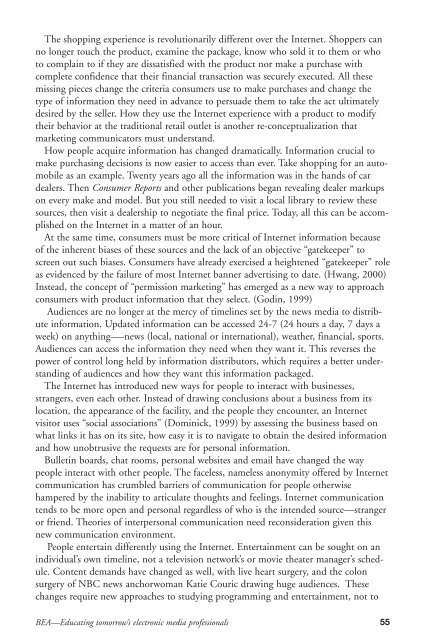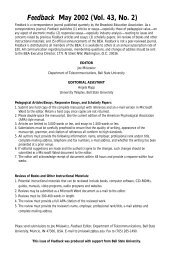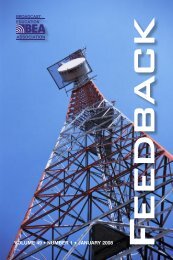Feedback November 2002 (Vol 43 No 4)
Feedback November 2002 (Vol. 43, No. 4) - Broadcast Education ...
Feedback November 2002 (Vol. 43, No. 4) - Broadcast Education ...
You also want an ePaper? Increase the reach of your titles
YUMPU automatically turns print PDFs into web optimized ePapers that Google loves.
The shopping experience is revolutionarily different over the Internet. Shoppers canno longer touch the product, examine the package, know who sold it to them or whoto complain to if they are dissatisfied with the product nor make a purchase withcomplete confidence that their financial transaction was securely executed. All thesemissing pieces change the criteria consumers use to make purchases and change thetype of information they need in advance to persuade them to take the act ultimatelydesired by the seller. How they use the Internet experience with a product to modifytheir behavior at the traditional retail outlet is another re-conceptualization thatmarketing communicators must understand.How people acquire information has changed dramatically. Information crucial tomake purchasing decisions is now easier to access than ever. Take shopping for an automobileas an example. Twenty years ago all the information was in the hands of cardealers. Then Consumer Reports and other publications began revealing dealer markupson every make and model. But you still needed to visit a local library to review thesesources, then visit a dealership to negotiate the final price. Today, all this can be accomplishedon the Internet in a matter of an hour.At the same time, consumers must be more critical of Internet information becauseof the inherent biases of these sources and the lack of an objective “gatekeeper” toscreen out such biases. Consumers have already exercised a heightened “gatekeeper” roleas evidenced by the failure of most Internet banner advertising to date. (Hwang, 2000)Instead, the concept of “permission marketing” has emerged as a new way to approachconsumers with product information that they select. (Godin, 1999)Audiences are no longer at the mercy of timelines set by the news media to distributeinformation. Updated information can be accessed 24-7 (24 hours a day, 7 days aweek) on anything—-news (local, national or international), weather, financial, sports.Audiences can access the information they need when they want it. This reverses thepower of control long held by information distributors, which requires a better understandingof audiences and how they want this information packaged.The Internet has introduced new ways for people to interact with businesses,strangers, even each other. Instead of drawing conclusions about a business from itslocation, the appearance of the facility, and the people they encounter, an Internetvisitor uses “social associations” (Dominick, 1999) by assessing the business based onwhat links it has on its site, how easy it is to navigate to obtain the desired informationand how unobtrusive the requests are for personal information.Bulletin boards, chat rooms, personal websites and email have changed the waypeople interact with other people. The faceless, nameless anonymity offered by Internetcommunication has crumbled barriers of communication for people otherwisehampered by the inability to articulate thoughts and feelings. Internet communicationtends to be more open and personal regardless of who is the intended source—strangeror friend. Theories of interpersonal communication need reconsideration given thisnew communication environment.People entertain differently using the Internet. Entertainment can be sought on anindividual’s own timeline, not a television network’s or movie theater manager’s schedule.Content demands have changed as well, with live heart surgery, and the colonsurgery of NBC news anchorwoman Katie Couric drawing huge audiences. Thesechanges require new approaches to studying programming and entertainment, not toBEA—Educating tomorrow’s electronic media professionals 55
















